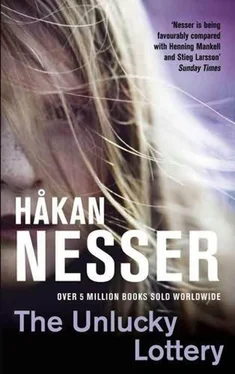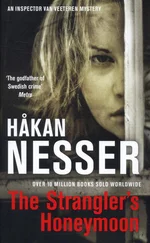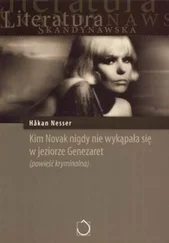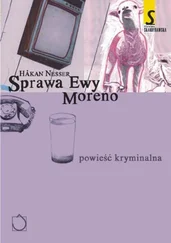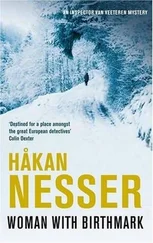‘Inside herself?’ said Münster.
‘You could put it like that. Never anywhere distant from her immediate surroundings, in any case. Neither in time nor space. But contented, as I said.’
Münster thought for a moment.
‘Is she on medication?’
DeBuuijs shook her head.
‘Not any more. Or nothing to speak of, in any case.’
‘Any kind of… treatment?’
She smiled again.
‘I thought we’d get round to this eventually,’ she said. ‘We are expected to do something , after all – right? The least we can do is to try to restore some kind of dignity… Yes, of course Irene undergoes therapy – if she didn’t, she would presumably come to a full stop one of these days. As it were.’
Münster waited.
‘We work partly on a traditional basis,’ explained deBuuijs, ‘but we also experiment to some extent. We don’t take any risks, of course, but in Irene’s case it has worked surprisingly well – or at least, that’s what our therapist says.’
‘Really?’ said Münster.
‘We have a sort of conversational therapy every day. In small groups. We do that with all our patients. And then we have a few therapists who come here and work on an individual basis. Various schools of thought and methods – we don’t want to exclude anything. Irene has been meeting a young woman by the name of Clara Vermieten for nearly a year now, and it seems to have gone well.’
‘In what way?’ Münster asked.
‘I don’t really know,’ said Hedda deBuuijs. ‘They’re having a break at the moment because Clara has just had a baby, but she intends to continue the therapy in spring.’
Münster began to wonder if she had something hidden up her sleeve, or if she was just making conversation out of pure politeness.
‘If you would like to partake, I can fix that,’ said deBuuijs after a short pause. ‘Seeing as you have come all this way.’
‘“Partake”?’
‘All the conversations are recorded on tape. I haven’t heard them, but I phoned Clara when I heard that you were coming. She has nothing against your listening to the tapes. Assuming that you don’t abuse them in any way, of course.’
‘Abuse them?’ said Münster. ‘How would I be able to abuse them?’
DeBuuijs shrugged.
‘I might have to switch off certain comments now and then,’ she said. ‘That’s part of my job. Is that okay with you?’
‘Yes,’ said Münster. ‘These things happen.’
DeBuuijs stood up.
‘I think we are on the same wavelength,’ she said. ‘Come with me, I’ll take you to her room. You can sit there for as long as you like. If you’d like a cup of coffee while you’re listening, I’ll bring you one.’
‘Yes, please,’ said Intendent Münster. ‘I could do with one.’
‘What do you mean?’ said Jung. ‘How it happened?’
‘It’s an idea that struck me,’ said Moreno. She bit her lip and hesitated for a few seconds. ‘Do you remember that day – a Thursday, I think it was – when Arnold Van Eck reported that his wife had disappeared? We drove there… Come to think of it, it was just Münster and me. Anyway, we arrived at Kolderweg to talk to Van Eck. We met fru Leverkuhn in the entrance hall. She was clearing away stuff that had belonged to Waldemar, carrying out suitcases and sacks with his old clothes. She was going to take them to the charity shop in Windemeerstraat. She was busy doing that for most of the time we were there. But of course… of course, it wasn’t just clothes she was carrying out.’
Rooth froze, with his coffee cup halfway to his mouth.
‘What the hell are you saying?’ he exclaimed. ‘Are you suggesting… are you suggesting that she was carrying out the Van Eck woman before your very eyes? Butchered and packaged? That’s the most… Who was it who said something about a blind boy a few minutes ago?’
‘It’s not possible,’ said Reinhart. ‘Or maybe that’s exactly what it is,’ he added after a few seconds. ‘Do you really believe this?’
‘I don’t know,’ said Moreno. ‘What do you all believe?’
‘Believing is something you do in church,’ said Rooth. ‘You were the one there, watching. How the hell could we know what she had in the bags?’
‘It’s a bit steep,’ said Jung. ‘It sounds incredible.’
Nobody spoke. Moreno stood up and started walking back and forth in front of the window. Reinhart watched her as he scraped out his pipe and waited. Rooth swallowed his Danish pastry and looked round for another. When he failed to find one, he sighed and shrugged.
‘Okay,’ he said. ‘As you all seem to have been struck dumb, I’ll take over the baton. Shall we go there again? For the seventy-fourth time? In any case we need to check if there’s anything left of that magazine. And see if we can find any blood-stained suitcases. Although we ought to have found those already if they exist. If it is as Moreno says, it would be the most… Christ Almighty, the most…’
He couldn’t think of what it would be. Reinhart put down his pipe and cleared his throat demonstratively.
‘Jung and Moreno,’ he said. ‘You know the way?’
‘Haven’t you left yet?’ said Rooth.
‘There’s just one thing I don’t understand,’ said Moreno after they had established that there wasn’t so much as a quarter of a square centimetre left of the Breuwerblatt ’s September issue – or any sign of blood-stained suitcases – in the Leverkuhns’ flat in Kolderweg. ‘If it really was her who did it, that is.’
‘What?’ said Jung.
‘Why?’ said Moreno.
‘Why what?’
‘Yes. Why on earth would she want to kill Else Van Eck as well?’
Jung thought for three seconds.
‘Where do you think she did it?’ he said. ‘The butchery, I mean. If we ignore why for the moment.’
Moreno shook her head.
‘How should I know? The bathtub, perhaps. Yes, she hit and killed her with a frying pan, then butchered her in the bathroom – that sounds about right, don’t you think? That’s what I’d do. Afterwards you only need to rinse everything down, maybe a bit of soap or scrubbing powder. But why? Tell me why! We can’t just ignore the cause, there must be a reason.’
‘I don’t know,’ said Jung. ‘I’m just one of the blind boys.’
At a quarter to two – that same rain-free January day – there was a discreet knock on the door of Intendent Reinhart’s room.
‘Come in,’ said Reinhart.
The door opened slowly, and Winckelhübe the linguist popped his head round it.
‘Ah, yes,’ said Reinhart, looking up from his pile of papers.
‘Well, I’ve made a little analysis,’ said Winckelhübe, scratching his stomach. ‘I’m not a hundred per cent certain, but I’m prepared to bet on it being about seals. The text, that is.’
‘Seals?’ said Reinhart.
‘Yes, seals,’ said Winckelhübe.
‘Hmm,’ said Reinhart. ‘Bang on. That’s exactly what we suspected. Thank you very much. Send your invoice to the police authorities.’
Winckelhübe remained standing there, looking slightly confused.
‘Would you like a lollipop as well?’ asked Reinhart. ‘I’m afraid we’ve run out.’
It was obvious that the therapist Clara Vermieten treated several of the patients at the Gellner Home. In the bookcase of the cramped office deBuuijs showed Münster into, four of the shelves were marked with initials. It said I.L. on the top shelf, where there were several cassettes, neatly sorted into stacks of ten. Münster counted sixty-five of them. The shelves lower down contained significantly fewer.
On the tiny desk was a portrait of a dark-haired man of about thirty, a telephone and a cassette recorder.
Читать дальше
